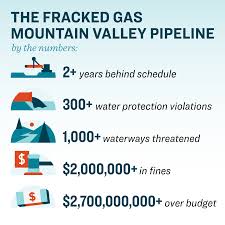 WV environmental groups press case challenging DEP water quality certification for Mountain Valley Pipeline
WV environmental groups press case challenging DEP water quality certification for Mountain Valley Pipeline
From an Article by Mike Tony, Charleston Gazette, WV, October 20, 2022
The Mountain Valley Pipeline has been delayed for years by legal and regulatory challenges, driving up project costs and fueling doubts that it will ever be completed.
Two of the pipeline’s most prominent supporters have been Sen. Joe Manchin, D-W.Va., and Sen. Shelley Moore Capito, R-W.Va., who both introduced legislation last month that would mandate completing the project. Manchin and other project proponents have bemoaned the pipeline’s setbacks in the 4th Circuit Court, which has handed down key rulings holding up the project.
In January, the 4th Circuit invalidated federal approval for the pipeline to cross the Jefferson National Forest. The following month, the court struck down a conclusion by the U.S. Fish and Wildlife Service that constructing the pipeline is unlikely to jeopardize endangered species. That move prompted the U.S. Army Corps of Engineers to commit to withholding a key water discharging permit until there is a valid conclusion on the project’s effects on potentially threatened species.
In a separate filing with the Federal Energy Regulatory Commission that regulates interstate natural gas pipelines Wednesday, the Fish and Wildlife Service took issue with observations that Mountain Valley made about the project’s impacts on the candy darter, an endangered freshwater fish that the agency says is located only in the Upper Kanawha River basin.
Fish and Wildlife rejected a Mountain Valley observation that water quality and division of habitats into smaller patches isolated from each other are “minor stressors” to candy darters. The agency said that extirpation of at least nine candy darter populations is attributed to water quality and habitat stressors alone. Extirpation is the local extinction of a species. Fish and Wildlife flagged Mountain Valley’s statement that climate change-related stressors aren’t considered a primary risk to the viability of candy darters “somewhat misleading.” The agency noted that sedimentation and habitat degradation have played a “major role” in threatening the species’ survival.
Fish and Wildlife called Mountain Valley’s assertion that there likely are no candy darters “perennially occupying” a dry stream reach in Stony Creek, Virginia, near the confluence with the New River “unsupported by any data” and urged the company to produce evidence to show the extent and duration of stream lost to drying needs.
“[N]o sedimentation is ever mobilized during dry conditions with no precipitation. The relevant question is whether [candy darters] might occupy these stream areas when they are wetted, the same time as which sediment might be mobilized,” the agency commented.
Mountain Valley’s comments came in an updated biological assessment supplement it submitted to Fish and Wildlife after the 4th Circuit Court vacated a 2020 biological opinion from the agency for the project in February. Fish and Wildlife asked for clarification and additional information on a wide range of issues related to impacts on candy darters and other species within 14 days.
Mountain Valley spokeswoman Natalie Cox said that Fish and Wildlife’s request for additional information is “normal course of business for the regulatory review process.” Mountain Valley will provide responses by the deadline, Cox said.
The DEP’s water quality certification for the pipeline followed another issued by Virginia environmental regulators 15 days earlier. Environmental groups also are challenging that certification in the 4th Circuit Court.
XXX
